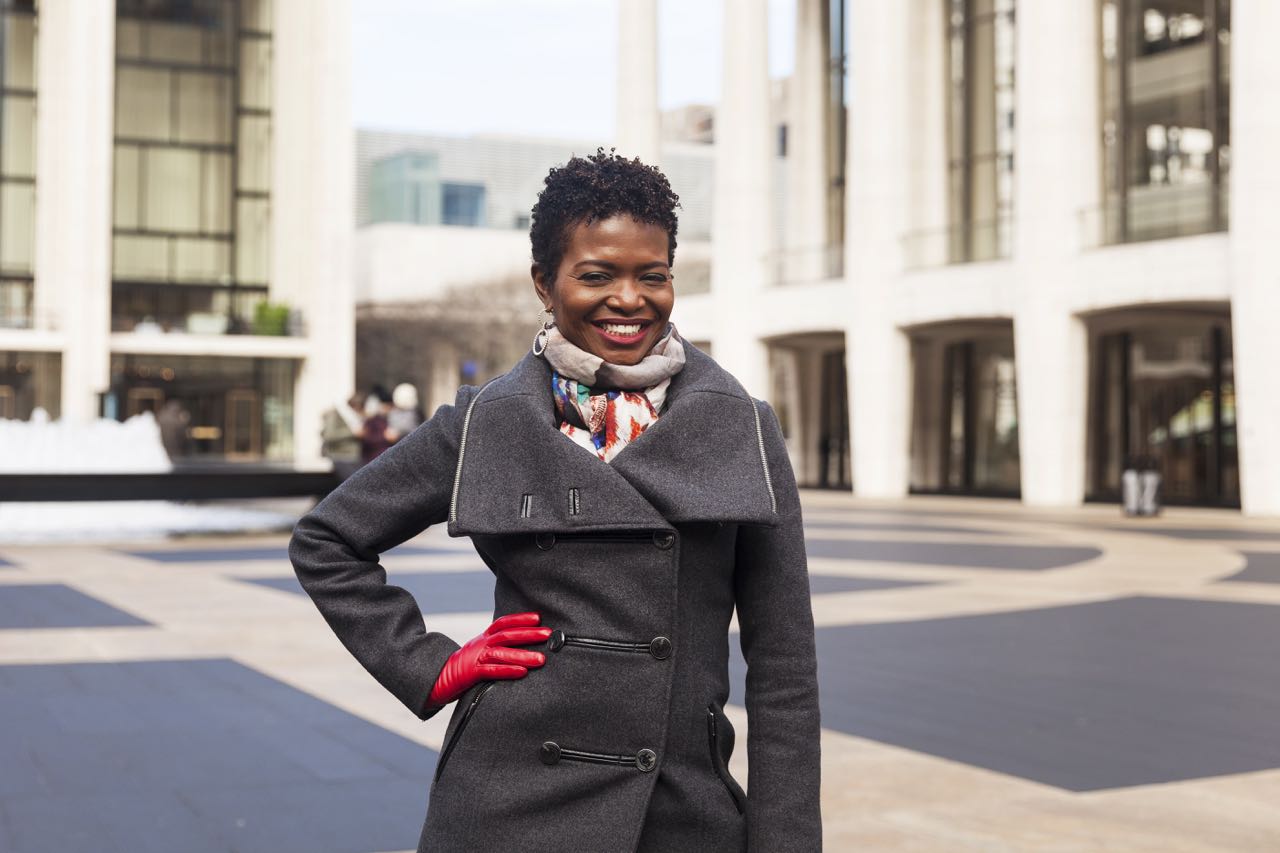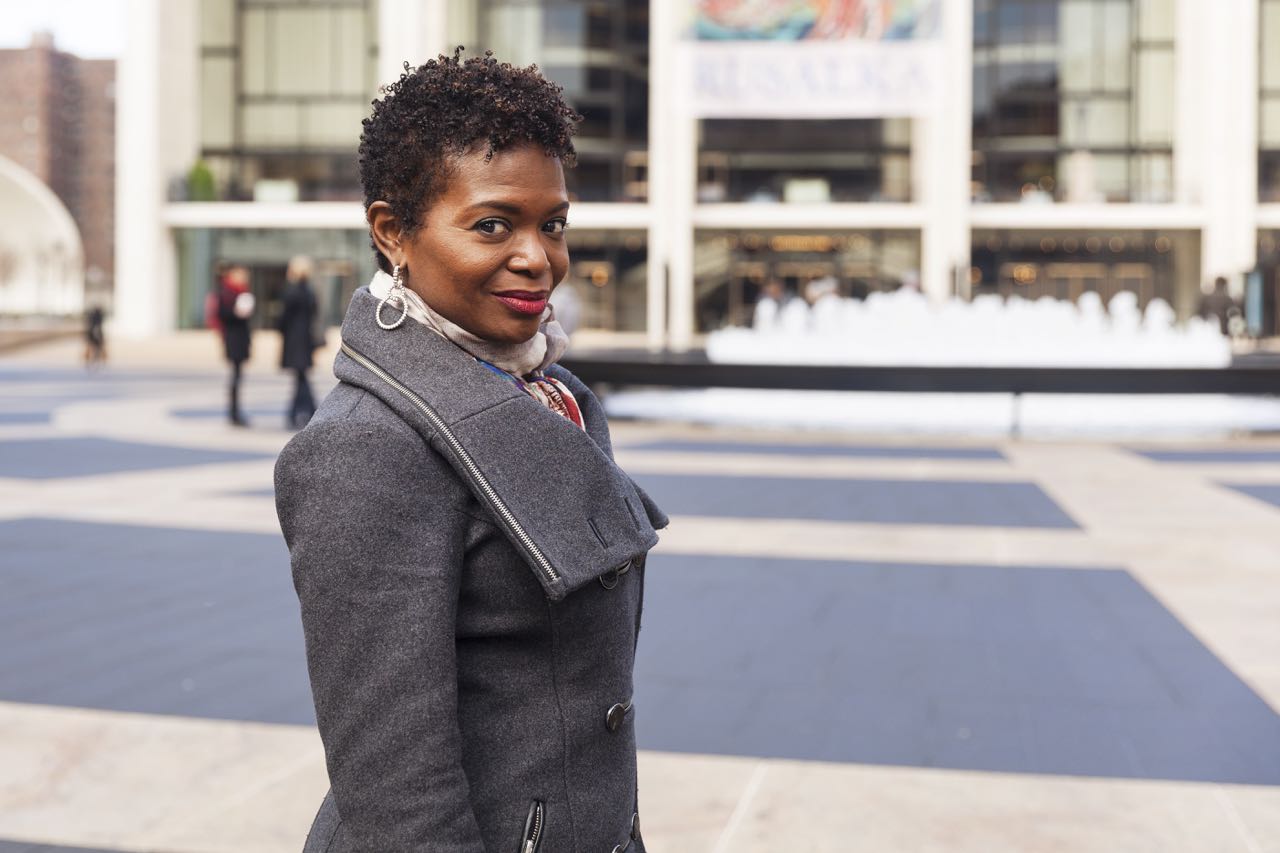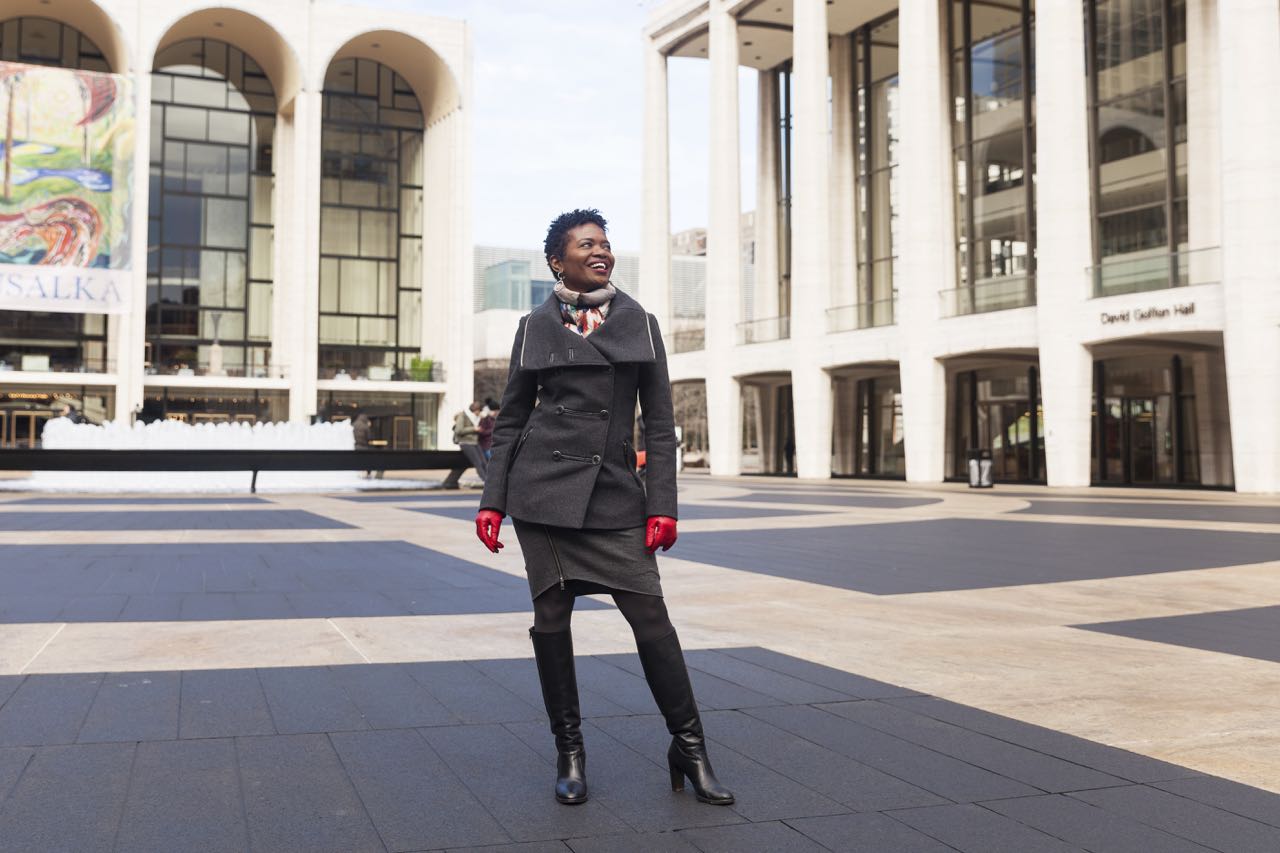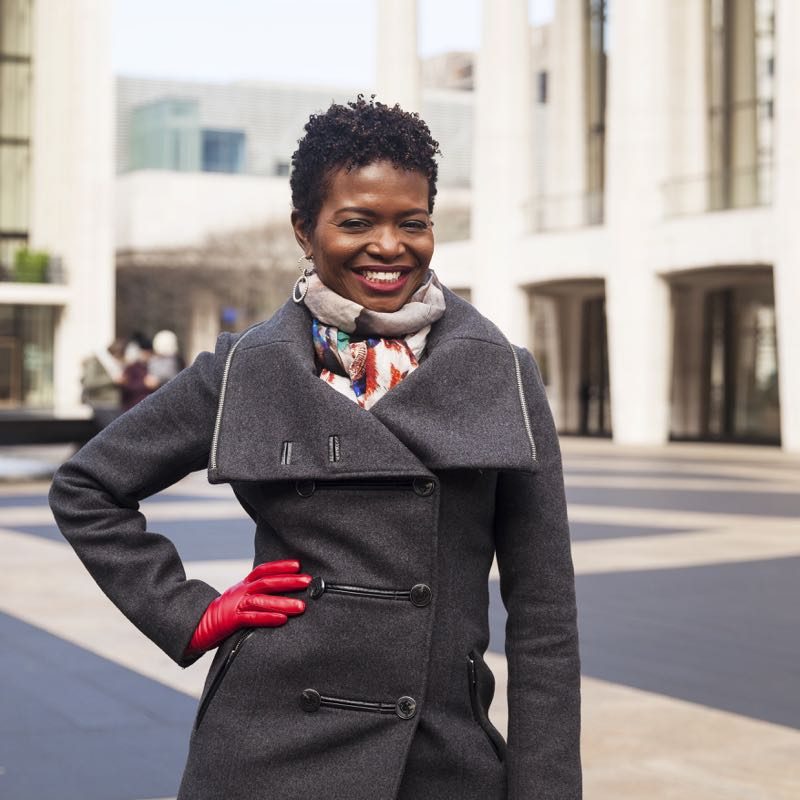An Interview with LaChanze

Written by Victoria Myers
Photography by Jessica Nash
February 22nd. 2017
In 2006, LaChanze won the Tony Award for Best Actress in a Musical for her performance in The Color Purple. A little under a decade later, she started putting together a one-woman show about her life and career. Now, she’s bringing that show to the Highline Ballroom on February 27th. The show has continued to evolve and includes songs that she wrote as well as theatre standards from shows she’s starred in. Her other theatre credits include If/Then, Once on This Island (for which she earned a Tony nomination), Ragtime, and Dessa Rose. We sat down with her to discuss her solo show and how she put it together, her philosophy for working in theatre, how the theatre community can make things better for working mothers, and more.
One of the things I’m always curious about when people are doing solo shows is how you pick what songs you want to do. How did you decide on the songs for Feeling Good?
You know, it’s funny. I’ve been building the idea of this show now for a couple years. It started as a cabaret down at Joe’s Pub. Then I took it to the Kennedy Center in DC, and I took it out to Seattle. It’s been evolving. It’s gone from a cabaret to a concert, and now it’s evolving into a one woman show. What I’m doing is I’m taking the audience through very significant moments in my life through song, starting from my childhood, growing up in the sixties and seventies in a very Afro-centric family, a very “power to the people” kind of environment, and taking you through my adolescence, coming into this industry, falling in love, unfortunately losing my husband, giving birth. I feel that at this stage in life, what I know so far has been really helpful and can be helpful for others that may be interested or who are looking to see how I’ve gotten where I am today coming from my humble beginnings.
When you were putting it together and picking the songs, were you like, “Okay, this is a moment in my life I want to highlight, and what song goes with that?” Or did it stem from the songs and finding they matched with certain moments? Or a mixture?
Basically, it’s a little bit of both. There are songs that I absolutely love. I would listen to them and think, “Can this apply to a moment in my life?” The title song Feeling Good is really what inspired me to do the entire thing, because to me the song pretty much encapsulates how I feel today about my life. I look at the things around me, and I feel good about living in the moment, and grateful for what I have in this moment right now. That’s pretty much where it springboards from. But then last night, I was up very late trying to find a song to illustrate this particular moment in my life: being in love with my husband. I have a song about falling in love with him, but I needed a song about being in love. Do you have any idea how many songs are out there about being in love? I was up very, very late trying to find the right song. Luckily, at the end of the night, when I was just about to go to bed, I stumbled on something that’s going to work.
When you first hear a song or a piece of music, do you relate to it on an emotional level first, or do you have a visual connection with it, or something else entirely?
It depends on the song. Some songs just have a really good beat and I want to bop my head to it, but then there are other songs where the chords can be emotional chords and it’ll strike me emotionally first. It depends on the song. Oftentimes, jazz makes me think. Whenever I’m listening to jazz music, it engages my musical sensibility, and so I’m immediately thinking about the chord changes and the melodic structure of the song and the tempo and the rhythm, so it engages my musical intellect. Then I might listen to a piece like a standard, something that Barbra Streisand might sing, and that’ll engage me emotionally. Oftentimes the songs in musical theatre engage me emotionally. Sometimes they’re just a lot of fun. So it’s a combination.
Do you find there are different challenges depending on where the song is coming from? Like if it’s a musical theatre song versus a jazz song, the challenge is different in terms of how you interpret them?
The way I look at it is, a song is a song. It literally is a story put to music. Musical theatre, because it is written for a story, usually already has a story in a song. It’s difficult if you’re trying to take that song and put it into your own personal story. Stephen Sondheim’s “Losing My Mind” from Follies, that’s a great song. It can be applied to several people’s lives about falling in love with someone and what it feels to be so obsessively in love with a person. You feel like you’re losing your mind. That’s an indication of a song that can be used in someone’s concert as well as in a show. But finding songs with great lyrics is a bit of a challenge sometimes, because you want it to be personal. There are a couple moments I could not find songs for, so I wrote songs. Two moments in particular. I have two brand new songs in the show because I could not find music for the moment.
I want to come back to that, but I wanted to ask you what your process is like for the in between songs moments in the show.
This show is pretty much a one woman show. Everything is written. It’s not just patter, patter, patter, song, patter, patter, patter, song. I’m taking you into my life. There will be moments of where I’ll go into a monologue or I do a little spoken word in between or I might read a letter. I’m setting you up for the next beat in my life. It’s not necessarily going to be chronological. I may jump around, maybe just because the moments are so strong, and they may need to fit different places. For this particular performance, it is scripted entirely. I actually have a script for the show.
What’s your writing process like for the songs that you wrote? What’s your jumping off point?
I usually start with the vibe of the song, the energy of it. Sometimes I wake up and the melody is on my mind. I wake up and it’s in my head, and I lean over, grab my phone, and start singing it into my voice memos. Then other times I have an emotion that I want to write about, so I’ll just put the lyrics down and call one of my friends who is a composer and say, “Can you put this to music?” One song, I woke up with the melody. The other song is written with the record producer of my EP.
Are there other areas of culture, like visual arts, that are part of your process and inspiration?
Well being an actor, oftentimes I see the scene of the moment. I basically set up a full environment for myself, even though it may just be me and a microphone, so that you can go on the journey with me. There are some songs where I’m just singing to you, and there are other songs where I’m bringing you into me because I need you to come on this journey with me. It may be a private moment that’s public. Oftentimes I’m inspired by what the lyric is. If the lyric is something where I’m describing the environment, then I may use a visual aid. I may use a projection or I may use a prop, something small, just to help set the space and give you an idea of where we are.

Let’s talk about your theatre work. When you get a part, what’s your jumping in point for that? Do you look for ways that the character is similar to you or different?
The first thing I do is find ways that the character is similar to me because acting is putting yourself in an imaginary circumstance. To be true to the character, I have to start with myself. It may be a role that’s not like me at all, but the emotions of every person basically are the same. I find the common thread. So if the character is vulnerable about whatever they’re doing—they’re murdering someone and they feel badly about it—I try to connect with that first, the emotion. Then the action comes separately. Usually going into the emotion of the character is the first way in, and how it lines up with me typically. When you’re studying acting, the first thing you do is you start with the emotion. Then you branch out from there. I’m just myself in the roles, most of them. Whether I’m being silly or funny or sad or intense. I’m being these characters as myself.
Do you like to come into rehearsal with a lot, or do you like to wait and see what happens in the room?
I discover on my feet. I have an objective, but for how we’re going to arrive at the ultimate image, I usually get on my feet. I find if you come in too prepared, you’re in your head, for the most part, on stage. You’re just in your head. That’s not healthy. It’s hard to share with the audience and let them in if I’m in my head.
Do you like to rehearse or do you like to find things more in performance?
I like to rehearse because I discover in rehearsal. Like I said, I learn on my feet. The focus is better for me in rehearsal, with the director, with the composer, with the other actors, because we’re creating something, and it needs to be live and active. If I’m sitting at my desk in my office at home, and I’m creating these emotions, I may find something I can try out the next day in rehearsal, but oftentimes, it’s fresher in the moment, more organic.
Do you think longer rehearsal periods would be better?
Actually I think shorter rehearsal periods would be better, because after a while you get brain dead and you need to take a break. Honestly, I think these ten hour days of rehearsals are too much. It would be more organic if you had six hours of a rehearsal where you can just get in there. I love when you do workshops and you have [just] the six hours because you start, your energy’s focused, you’re in there. It’s when it goes on too long that you start to lose focus and everyone starts relying on other things. It isn’t as organic. For me, the process would be better if it was shorter.
You have kids, and you worked while pregnant and while they were little. How do you think the theatre community can be better for women who have families and work at the same time?
I don’t think our community is a community of families. The majority of people in my industry don’t have kids. Very few. The community doesn’t really support it. It’s often a surprise. It has been in my life. When I say, “Oh, I can’t do something because I have to go to a parent meeting at school or I need to bring my kid with me,” it’s often [a surprise to people]. It changes the environment a little bit. Because it’s a very adult environment. People just aren’t used to having kids running around. I think it would be better if people were a little bit more inclusive with parents and with children, just like any other profession, and allow for the reality of the time that it takes to raise a child. Now, don’t get me wrong, in every professional setting I’ve ever worked in, when it came to my children, they have been very accommodating. If I needed something, they were like, “Oh, okay, we can accommodate that.” But this is just my own personal experience, it’s not something that I think is an across the board way of looking at it.
Other people have mentioned that when they were first having their children they kind of looked around and went, “Huh, there aren’t a lot of people doing this.” Did you have that experience at all?
I was very supported. When I was pregnant, I was doing Ragtime. Right after she was born, I was doing [The] Bubbly Black Girl[Sheds Her Chameleon Skin]. I had my second daughter and, right after that, I was doing The Vagina Monologues. Again, in each situation they’ve been supportive. I’ve been able to bring my daughter backstage if I need to, but there isn’t any structure for that from our union. I’m not complaining. I’m just saying, if someone gave it some thought, if there were some sort of parental accommodation within contracts, it would be helpful. But because there isn’t, it’s sort of like the Wild West. You bring your kids and they might say no or they might say yes. There’s nothing to back you up. There’s nothing in place to support the situation. You have to be fortunate to have great producers and directors that are sensitive to it.
One of the things I’m always really interested to ask actresses about is how they develop as an artist in an industry that can be very into typing people. How do you continue to grow when you have a lot of people telling you what you’re good at, what you’re not good at, and things like that.
In this industry we’re just scrutinized in every single way. Being a woman at my age, in mid-life now, it’s even more scrutiny, because this industry favors youth in a way that the younger you are the more interesting they want to see you as. Those of us that have had the career longevity that I have, we have a lot more experience. We bring another dimension to the table. We come up against how society sees us, which is why I’m doing this show. You have to reinvent yourself and take the bull by the horns and pretty much take control of the situation and be your own producer. At this point, it’s not that I don’t think there aren’t great roles out there for me. I’m sure there are. But I want to do this right now. This is the stage in my life that I’m in where I’m halfway there, and I want to talk about how I got this far as I look back over the years in my life. The fact that I am happy and feeling really good, it’s a good time to talk about how I got to feel good. These days people can use a little inspiration, a little motivation, given our political climate, given our social climate, given all the things that are pulling us into a negative state of mind. It’s nice to be reminded of how far one may have come and to appreciate their journey and where they are, and not allow the outside stimuli affect us inside. To really stay focused and centered on yourself and what’s valuable about you. That’s what my concert Feeling Good is about: to uplift and inspire.
Is coming around to that attitude something that you had to work on?
In life, you have ups and downs. That’s the natural law of the universe. There’s day and night, there’s good and bad, there’s ups and downs. You have to go on your own natural ride, but you also have to remember that it is a ride. Just like you’re going down a hill, it goes back up. You have to remember to look forward. If you see the goal, all the way down, you see that it’s going to be okay. If you know that, on the journey, it doesn’t stunt your growth. You can continue to grow. Like your GPS, it will just re-route you.
You mentioned the current political climate. Has that affected how you’re putting together the show at all?
No, I’m trying to stay away from politics. I’m really bummed out by the current political climate. In fact, I have found myself, over the weekend, feeling kind of blah, kind of down. That’s not my usual setting. I’m usually pretty peaceful and happy and content with myself. But I’ve been noticing that I’m a little short tempered and a little irritable. I think it’s because of the news. I’m listening, I’m reading, I’m watching, I’m paying attention. I find myself being a little on edge. I think it’s because of the political situation that we’re in. It’s like every day, something else happens, and it just irritates me that we live in a country that is allowing these sort of things to happen, and I’m almost shocked that they’re happening.
Do you have a spiritual life and does it affect your work?
Yes. Most definitely. I am a Christian, and I am a strong believer in God and the power of God in our lives and the spirit of God in our lives. I pray every morning. Whenever I am feeling outside of myself or too inside of myself, I go to God in prayer. I am a strong believer in the spirit of God leading my life to something purposeful.

If you could change one thing about the Broadway theatre world, what would it be?
More female directors. We need more women in leading positions. More female producers, more female directors, more female composers. Just like the makeup of our society, male and female energy is needed in every element of life. When it’s dominated by men, it’s out of balance, and I think that our industry, unfortunately, it’s dominated by men. The sensitivity, I think sometimes that a woman can bring to a situation, is lost. Not just because of the gender. It’s because of a woman’s position in the world, how we see things. I think that is an added perspective that’s lost when you have men in complete control creatively.
Is there a practical thing you think can be done to help improve that?
It isn’t like there aren’t women out there that direct and produce. It’s just that people aren’t trusting women with the work. It’s rare to see a black female director. Liesl Tommy was the first black female director, if you can believe it, to be nominated for a Tony. That was 2016. The first female black director nominated for directing a play on Broadway. That’s ridiculous. There are several brilliant directors. In fact, speaking of brilliant directors, my director is an African American woman, Tamara Tunie. Brilliant actress as well as a very sensitive director. She’s pulling things out of me that I never would have even conceived of doing on stage, particularly about my life, because it’s so personal. She’s like, “Oh, you have to talk about that. People won’t know how you are thriving today if they don’t know what you’ve been through.” She’s having me think about moments that I wasn’t even considering putting in the play. I’m putting them in the show now.
Do you have a dream project after this?
Well, my goal is to tour my show to different places in the country. That’s my goal. I’m hoping that some of the outlets that I’m not already planning to go to will pick up on the story and bring me to their theatres and their communities. After I have done my show, and I’m finished with my memoir, which is my next big project, and my children are off to college, then I’ll come back to the stage. I mean there are so many amazing roles. I want to do everything Patti LuPone has done. I want to be Evita. I’m a black woman, so we’ll see how realistic that is. But I love her career.

